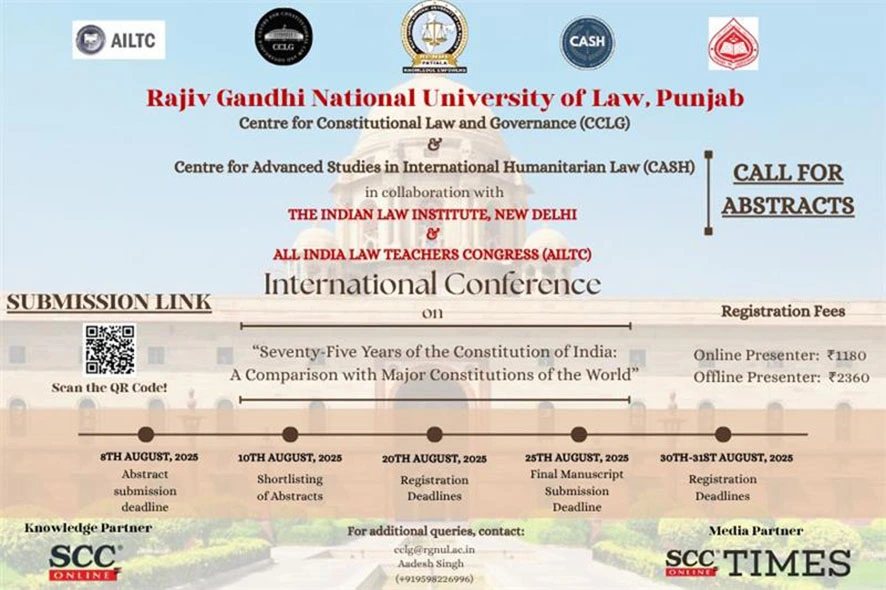ABOUT RGNUL, PUNJAB
The Rajiv Gandhi National University of Law, Punjab (Patiala) was established by the State Legislature of Punjab by passing the Rajiv Gandhi National University of Law, Punjab Act, 2006 (Punjab Act No. 12 of 2006). The Act incorporated a Law University of National stature in Punjab, thereby fulfilling the need for a Centre of Excellence in legal education in the modern era of globalisation and liberalization. The University acquired the approval of the Bar Council of India (BCI) in July 2006. In May 2015, the University became the first and only NLU to get accreditation by the National Assessment and Accreditation Council (NAAC) with an ‘A’ grade. In 2018, RGNUL, Punjab was amongst the four NLUs to have been granted autonomous status by the University Grants Commission. The University has been ranked among the top Law Schools in India under the National Institutional Ranking Framework (NIRF), by the Union Ministry of Human Resource Development, Government of India. The current emphasis of the University is on research, training, and consultancy in various contemporary legal domains and envisages to be a research-intensive university in times to come.
ABOUT CONFERENCE
The Constitution of India, which became fully operative on 26 January, 1950 laid down the foundation of Rule of law with all the dimensions of justice- social, economic or adjudicative. In its dynamic and unrelenting forming of Seventy-five years, it endeavoured to consolidate the Human Rights instinct and all cornered justice guided with liberty, freedom and brotherhood. It is the philosopher guide of our unparallel Republic. The Constitution of India read in conjunction with the preamble assimilated all phases of individual life, socio-economic aspects to the international friendship. Ensuring panacea for all kinds of diversities existing in our society, it constitutes a thread for inter-sectional and even contradictory thoughts embedded in India’s Socio-Economic and cultural diversity. Our constitutional adequately ensures the unity, integrity and sovereignty of the country at the same time leaving full scope for a participative democracy from top parliament to the grassroot Panchayat. In nutshell, the Constitution of India is the ‘Sagar in Gagan’ The conference additionally reinforces objectives of making justice not just accessible but also participatory, compassionate, and transformative.
TARGET AUDIENCE/ELIGIBILITY
- Judges
- Advocates
- Academicians
- Law Students
- Government Officials and Policymakers
- Members and Officers of Legal Services Authorities
-
NGOs and Human Rights Organisations
THEME AND SUB-THEMES
- The Constitution of India and the Constitutions of Developed Countries like U.S.A, UK, Canada, Australia, Switzerland, France, Germany, Japan and other Countries
- The Constitution of India and the of Constitution of the Developing Countries
- The Constitution of India and the Constitutions of Under-developed Countries
- The Constitution of India and International Relations
- The Constitution of India and International Law
- The Constitution of India: Development, Directions & Dimensions
- Constitutionalism in India: Theoretical Foundations
- Federalism and Power Sharing: Lessons from Major Constitutions
- Asymmetric Federalism: Models Across Jurisdictions
- Social Justice: Comparative Perspectives
- Judicial Appointments: Comparative Perspectives
- Judicial Independence: Comparative Perspectives
- Secularism and Religious Freedom: Contemporary Developments
- Local Governance: India and Abroad
- Constitutional Perspectives on Decolonisation of Indian Law
- The Constitution of India and Indian Knowledge Systems
- Basic Structure and Constitutional Identity of India
- Constitution and Human Rights in major Constitutions of the World
- Constitutional Justice and Social Equity: Promise v. Practice
- Constitutional Amendments: Comparative Perspectives
-
Legal Aid and Access to Justice: Comparative Innovations and Developments
LOCATION
The International Conference on “Seventy-Five Years of the Constitution of India: A Comparison with Major Constitutions of the World” shall be held on 30th-31st August 2025, at Rajiv Gandhi National University of Law, Patiala, Punjab. The Conference will follow a hybrid format.
SUBMISSION GUIDELINES
- Submission must be an original work of the author(s).
- A maximum of two authors is allowed per paper.
- A brief bio-note (maximum 150 words) of the authors to be submitted during the Registration process, detailing the designation and institutional affiliation of the
- author(s).
- A self-declaration must be submitted along with the full paper stating that the paper is an original work of the author(s) and that it has not been published/sent for publication anywhere else.
- Selected Manuscripts will be invited for presentation.
- Presenters are required to submit their Power Point presentations along with the full paper.
-
The details filled during the registration process shall be used for certification purposes. No request for change will be entertained later.
FORMATTING GUIDELINES
- The abstract must range between 300 to 500 words, outlining the methodology and the tentative outcomes of the research.
- The abstract must contain 4-5 key words.
- Full Paper: The word limit for full paper submission is 4000-6000 words.
- File must be in Microsoft Word editable format (.doc/.docx).
- The Citation style to be followed is Harvard Bluebook 21st Edition.
- Font: Times New Roman, Size: 12, Spacing: 1.5, Alignment: Justified.
-
Title must be Font Size 14, Times New Roman and Bold.
REGISTRATION PROCESS AND FEES
- The Conference will be held in hybrid mode. The registration fee is Rs. 1180/- (including GST) for online and Rs. 2360/- (including GST) for offline.
- Co-authors shall register individually.
- Registration fee for offline participants doesn’t include boarding and logistical charges.
- No request for refund shall be entertained post the payment of registration fees.
- The Participants are required to pay the registration fee by clicking on the below mentioned ‘Registration Link’.
-
The Abstract is to be submitted using the ‘Submission Link’ only.
IMPORTANT DATES
- Last Date for Abstract Submission: August 01, 2025
- Last Date for Shortlisting of Abstracts: August 05, 2025
- Last Date for Registration: August 20, 2025
-
Last Date for Submission of Final Manuscript: August 20, 2025
CONTACT INFORMATION
cclg@rgnul.ac.in OR Aadesh Singh (+919598226996)


